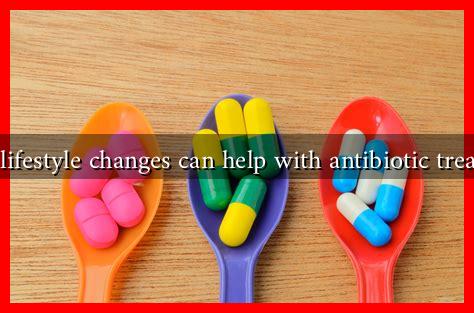-
Table of Contents
What Lifestyle Changes Can Help with Antibiotic Treatment
Antibiotics are powerful medications that can effectively treat bacterial infections. However, their efficacy can be influenced by various lifestyle factors. Making certain lifestyle changes can not only enhance the effectiveness of antibiotic treatment but also support overall health and recovery. This article explores key lifestyle modifications that can aid in the healing process while on antibiotics.
Understanding Antibiotics and Their Role
Antibiotics work by targeting specific bacteria, either killing them or inhibiting their growth. However, they do not work against viral infections, such as the common cold or flu. Misuse of antibiotics can lead to antibiotic resistance, making it crucial to use them responsibly. According to the Centers for Disease Control and Prevention (CDC), at least 30% of antibiotics prescribed in the U.S. are unnecessary, highlighting the importance of appropriate use.
Key Lifestyle Changes to Support Antibiotic Treatment
Implementing certain lifestyle changes can significantly enhance the effectiveness of antibiotic treatment. Here are some essential modifications to consider:
- Maintain a Balanced Diet
A nutritious diet plays a vital role in supporting the immune system. Foods rich in vitamins, minerals, and antioxidants can help the body fight infections more effectively. Consider incorporating:
- Fruits and vegetables (e.g., berries, spinach, and citrus fruits)
- Whole grains (e.g., brown rice, quinoa, and oats)
- Lean proteins (e.g., chicken, fish, and legumes)
- Fermented foods (e.g., yogurt, kefir, and sauerkraut) to promote gut health
Research indicates that a diet high in fruits and vegetables can reduce inflammation and improve immune function, which is crucial during antibiotic treatment.
- Stay Hydrated
Hydration is essential for overall health and can aid in the recovery process. Drinking plenty of fluids helps flush out toxins and supports kidney function, which is particularly important when taking antibiotics. Aim for:
- At least 8-10 glasses of water daily
- Herbal teas and broths for added hydration
Rest and Recovery
Rest is a critical component of recovery. When the body is fighting an infection, it requires additional energy to heal. Prioritize sleep and relaxation by:
- Aiming for 7-9 hours of quality sleep each night
- Incorporating short naps during the day if needed
- Practicing stress-reduction techniques such as meditation or yoga
Studies have shown that adequate sleep can enhance immune function and improve recovery times.
Avoiding Alcohol and Certain Foods
While on antibiotics, it is advisable to avoid alcohol and certain foods that may interfere with the medication’s effectiveness. Alcohol can increase the risk of side effects and may hinder the healing process. Additionally, some foods, such as dairy products, can affect the absorption of certain antibiotics. Always consult with a healthcare provider regarding dietary restrictions while on medication.
Probiotics: A Helpful Addition
Taking probiotics during and after antibiotic treatment can help restore the balance of good bacteria in the gut. Antibiotics can disrupt gut flora, leading to side effects like diarrhea. Probiotics can mitigate these effects and promote digestive health. Foods rich in probiotics include:
- Yogurt with live cultures
- Kefir
- Kombucha
- Fermented vegetables
Research published in the Journal of Clinical Gastroenterology suggests that probiotics can reduce antibiotic-associated diarrhea and improve gut health.
Conclusion
In summary, making thoughtful lifestyle changes can significantly enhance the effectiveness of antibiotic treatment. A balanced diet, proper hydration, adequate rest, avoidance of alcohol, and the inclusion of probiotics are all essential strategies to support recovery. By adopting these practices, individuals can not only improve their healing process but also contribute to their overall well-being. Always consult with a healthcare professional before making significant changes to your lifestyle or diet, especially when undergoing antibiotic treatment.
For more information on responsible antibiotic use, visit the CDC’s Antibiotic Use page.

